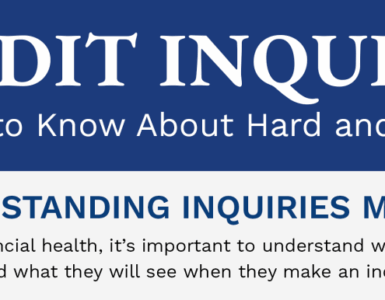On the surface, it might seem like a household budget and credit utilization are unrelated. One is the inflow and outflow of money and the other has to do with your credit score. As we dive a little deeper, we’ll uncover how these two are both related and connected. That understanding may also help improve your financial health. Let’s start with credit utilization.
What is the Credit Utilization Rate?
Credit usage or credit utilization rate is the amount of credit used out of your total credit available. For example, if you have a credit limit of $1,000 and you’ve used $500 on purchases, your credit utilization rate or ratio is 50%. The credit utilization rate is one of the biggest factors in your credit score. For FICO, it accounts for 30% of your score, and for VantageScore* credit utilization makes up 23% of your credit score.
What is a “Good” Credit Utilization Rate?
As a means of gauging your overall financial health, credit rating agencies give you a higher score if you have credit but don’t use too much of it. If you use too much of your total credit available, like maxing out your credit cards, this is considered risky and your credit score will go down. To maintain a good credit score, the guidance from credit rating agencies is to keep your credit utilization rate at 30% or below. So using the above example, out of a $1,000 credit limit you should only use $300 or less to maintain a good credit utilization rate.
Now that we’ve looked at the credit utilization rate, let’s look at your household budget.
Budgeting Basics
Budgeting helps you understand where you are and where you want to be when it comes to your money. The two basic components of a budget are income and expenses. Here’s a breakdown:
- Income. This includes any money going into your bank account. The most common form of income is salary or wages from a job. If you own a business, income is a function of sales of the goods and services you provide. Other forms of income include Social Security Income (SSI), disability, unemployment or other government pay, retirement savings like pensions or other workplace savings plans, commissions, dividends, interest income, capital gains, royalties, etc.
- Expenses. Any money that goes out of your bank account is considered spending or expenses. This includes things like mortgage or rent payments, utility bills, cell phone bills, groceries and other food, drug prescriptions, car loan payments, gas, insurance, entertainment, haircuts, subscriptions to streaming services, child care, a new pair of shoes, home internet service, or any other monthly spending.
Starting a Budget
Getting a better handle on your finances doesn’t have to be scary or difficult. It can be empowering to understand where you’re at financially because it gives you a starting point and allows you to make informed financial decisions.
- Start by collecting your pay stubs and anything to do with income, monthly bank or financial statements, and monthly bills including credit card statements. (If you don’t have statements or pay stubs, start with a spreadsheet or a notebook and track your income and expenses for a couple of months.)
- Add up all of your income, from all sources.
- Calculate all expenses, this includes all monthly bills and credit card spending.
- Compare your income to your expenses, and see if you’re spending more than you’re bringing in or how much money you have left over each month.
- Identify if you need to reduce spending or look for ways to increase income.
- Allocate income to savings, spending, paying down debt, and bills.
Knowing how much money is coming in gives you an awareness of whether that amount is too much or too little. It gives you the power to decide if you want to work more to bring in more money if you should cut expenses so you have more for entertainment, or if you want to save for a vacation. The other big takeaway from starting a budget is how you’re using your credit cards.
How Credit Cards Factor into Your Budget
When starting a budget, you gain insights into your spending habits and the impact of credit card usage. People use credit cards in different ways. Some people pay off their credit card balances every month. Others may only use credit cards for emergencies. And some may use credit cards to supplement income. Do an assessment where you look at your credit card spending to figure out where your money is going. Ask yourself the following:
- What are you using your credit cards for every month?
- Are your credit card balances increasing or decreasing each month?
- Is credit card spending supplementing your monthly bills?
- Are there expenses on your credit card that you could cut, like unused subscriptions, memberships, etc?
Using your budget you can see just how much (or little) credit card spending factors into your monthly expenses. How you use credit cards may also reveal action steps you could take to improve your financial health. Some action steps may include the following:
- Using high-interest credit cards to supplement income, may indicate you need to cut expenses or increase your income.
- Increased monthly credit card spending, might reveal you’re paying for unused services or memberships.
Credit Utilization and Your Budget
Your budget provides insight into income and expenses. Sticking to your budget helps you avoid overspending and using credit cards to supplement income. Using your income to cover expenses means you’re not using credit cards and racking up more debt. Building your budget may have uncovered additional ways to save money every month. Some of that excess cash can be used to pay down your credit card, which lowers your balances, and improves your credit utilization.
5 Ways Budgeting Can Help Improve Credit Utilization
A budget helps you to track your expenses, pay bills, allocate income, and manage credit more effectively. With insights from your household budget, the following tips can help you lower your credit utilization.
1. Stop Using Credit Cards
Setting up a budget helps flex your financial muscles. It means you’re learning additional ways to increase income and/or cut expenses. One thing you can do is stop all credit card use temporarily. This does a couple of things, it stops additional credit card usage and allows you to put additional cash toward paying down credit card balances.
2. Pay Credit Card Bill Early and Often
Credit card issuers often report your balances to the credit bureaus at the very end of a billing cycle. This means the reported balance and how much you spend that month could be different, making your balances appear larger. This impacts your credit utilization rate.
Here’s a quick example to illustrate:
- Your credit card has a $1,000 limit.
- You charge $500 per month and always try to pay in full. Your credit card company reports your balance of $500 before you’ve paid it off at the end of the month. This puts you at a credit utilization of 50% and your credit score takes a hit.
- If you pay off your card every time the balance reaches $150. Your reported balance is only $150, which knocks your credit utilization rate to 15%.
If you’re able to make multiple payments throughout the month, you can reduce your utilization rate once your balance is reported. Paying early and often instead of one larger payment may be a better way to improve your credit utilization regardless of when balances are reported.
Tip. If you get paid weekly, try to make a credit card payment once your paycheck lands in your bank account. Then you’re making 4 payments every month instead of just one lump sum payment.
3. Increase Your Credit Limit
Keeping your budget provides insight into where all your money is going. This gives you the discipline to consistently pay your credit cards often and on time. This is the kind of financial behavior credit card companies like. After 6 months or more, you can request a credit limit increase on your credit card.
Why?
If you receive a credit limit increase and don’t increase your spending level, you automatically improve your credit utilization rate. A higher credit limit means you have more available credit, which lowers your credit utilization.
4. Get a New Credit Card
As you continue good financial habits, your credit score will likely rise over time. Higher credit scores give the option to open a new credit card. A new credit card limit will increase your total available credit, and as a result, your credit utilization will decrease.
If you qualify for a card with a 0% intro interest rate, you can transfer a higher-interest credit card to that card and accelerate your debt paydown without interest.
Tip. Here’s something to consider when opening a new credit card. Getting a new card may reduce your average credit account age, which may lower your credit score. But, credit utilization is weighted more heavily in your overall score than credit age.
5. Keep Old Credit Accounts Open
Part of budgeting and financial health is organization. In the name of simplicity, you may be tempted to close one of your credit card accounts. That makes sense, it’s one less card to think about. In actuality, closing credit accounts hurts your credit. When you close an account you lose the total available credit associated with it, which impacts your credit utilization rate.
But, you can continue to reap the benefits of old or unused cards. A small charge to the card consistently, like a subscription service that you can easily manage, keeps the account open and active. This allows you to maintain the total available credit on the card, which helps lower your credit utilization rate.
Budgeting and Credit Utilization are Connected
Your household budget and credit utilization are connected and interrelated. They can have positive and negative effects on each other. They are also very fluid and won’t stay the same forever. As your financial situation changes, revisit your budget and your credit usage and make any necessary adjustments and changes. Having an understanding of how your budget and credit usage work together and how to adapt to changes will help improve your financial health over time.
*based on VantageScore 3.0






